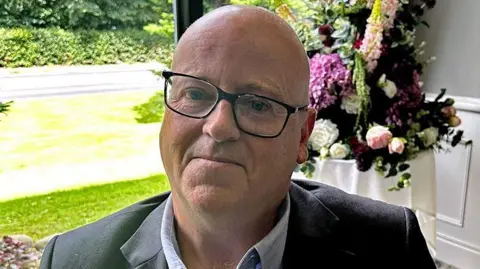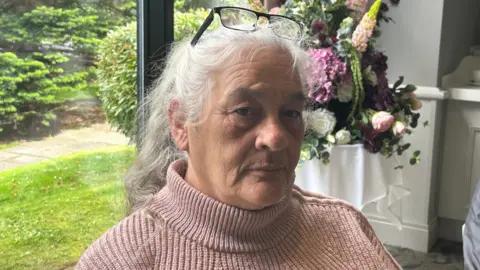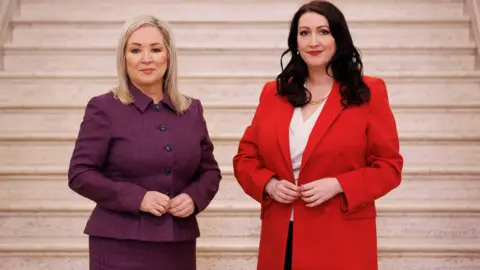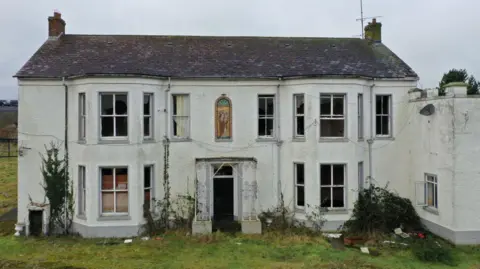Mother and baby homes survivors 'excluded again' by Executive Bill
 BBC
BBCA bill to establish a redress scheme for victims of mother and baby homes has been criticised by a survivor who says it excludes "thousands" of women and children who suffered.
Mark McCollum was one of thousands of children born to unmarried mothers in Northern Ireland who were sent to institutions.
More than 10,000 pregnant women and girls passed through the secretive institutions, which were largely run by religious orders, from the 1920s until the 1990s.
A bill to establish an inquiry into mother and baby homes, Magdalene Laundries and Workhouses - and an associated redress scheme - passed its first stage in the Stormont Assembly on Monday.
'No rationale'
Mark McCollum was born in Marianvale and then taken across the border to an orphanage in County Donegal.
He said survivors were "astonished yesterday at the omissions" in the bill.
"There's an arbitrary date for exclusion of... 29 September 2011, so anybody that died prior to that are not going to be included in the process," he said.
"That excludes thousands of potential women and girls and their adoptive children who passed away.
"What is the justification for that other than saving money," he said, adding: "There's no rationale for this."
Mr McCollum said before seeing the bill, there was "a sense of optimism" but that is no longer the case.
He added that mothers and adoptees have "been silenced and stigmatised for so long" and it feel likes they've "been excluded again".
He also said the bill "undermines its potential to deliver truth, acknowledgment and justice for the survivors".
'A kick in the teeth'

Marie Arbuckle grew up in Northern Ireland, but was sent to an institution in Dublin when she was 17.
She called the proposals "a kick in the teeth for many survivors".
"It seems to me that the government hasn't listened to us properly at all," she said.
She added: "Why do a consultation in the first place if the wishes and hopes of survivors aren't taken on board?"
Ms Arbuckle thinks the "drive to save money has simply gone too far and all at the expense of the wishes of victims."
"We have lost all confidence in the process we worked so hard on for the last three years."
KRW Law, who act on behalf of many victims and survivors of institutions and laundries, said there is "huge disquiet over the prospective exclusion of many survivors".
What is in the bill?
The Executive Bill will establish a statutory public inquiry and a statutory redress scheme.
It comes after a consultation on proposals to establish an inquiry into mother-and-baby homes was launched last year.
The estimated cost is £80m, which includes almost £60m in initial redress payments to cover approximately 6,600 redress claims.
Each eligible person will receive a payment of £10,000 and a £2,000 payment will be made to each eligible family member on behalf of a loved one who has died since 29 September 2011.
A further Individually Assessed Payment (IAP) for the specific harm suffered by an individual will follow the public inquiry.
The executive office said a process was already underway to appoint a designate chair of the inquiry.
Institutions were 'product of systemic misogyny'
First Minister Michelle O'Neill said: "These institutions and practices were a product of systemic misogyny. The regime inflicted on women and girls, many while heavily pregnant, was appalling and constituted cruel, inhuman and degrading treatment."
She added that not only did women have their rights "grossly denied within these institutions, so too did their children, now adults. They too were failed on every level."
O'Neill said that the legislation hopefully demonstrates a "sincere commitment" to those who "have suffered and been silenced".
She thanked those who campaigned for justice.
 PA Media
PA MediaDeputy First Minister Emma Little-Pengelly said: "We deeply regret the pain and suffering of victims and survivors and today is a testament to their courage as we introduce this important and significant legislation."
She added that victims have long waited for answers and that they will "seek to uncover the truth and hold those responsible to account".
"We remain committed to addressing this dark period of our past and we want to encourage everyone affected to come forward and be heard," she said.
What were mother and baby homes?
There was once a network of institutions across the island of Ireland which housed unmarried women and their babies at a time when pregnancy outside marriage was viewed as scandalous.
There were more than a dozen such mother and baby homes in Northern Ireland.
Three of them were Catholic-run workhouses known as Magdalene Laundries, where women frequently had to do exhausting, unpaid labour.
Researchers found that a third of those admitted were under the age of 19, with the youngest child to be admitted aged 12.
 Getty Images
Getty ImagesA number were the victims of sexual crime, including rape and incest, and "strenuous physical labour" was expected of residents late into their pregnancies.
Many women and girls were separated from their children by placing them in children's homes, boarding them out (fostering) or through adoption.
There was also the issue of the cross-border movement of women and children in and out of the institutions.
The last institution in Northern Ireland closed in 1990.
What redress schemes for victims of mother and baby homes are there?
In the Republic of Ireland the Institutions Payment Scheme, €800m (£683m), the redress scheme established by the Irish government, opened for applications in 2024.
It aims to acknowledge the circumstances experienced in mother-and-baby or County Home Institutions in Ireland.
More than 30,000 people are believed to be eligible for the scheme but to date only about 6000 have applied.
The proposed scheme in Northern Ireland is still at an early stage.
Legislation, which will establish an inquiry into Mother and Baby Institutions, Magdalene Laundries and Workhouses, and a redress scheme was introduced on Monday and will follow the legislative process.
